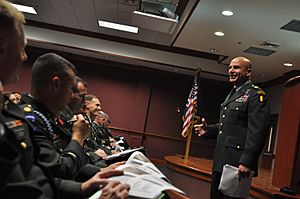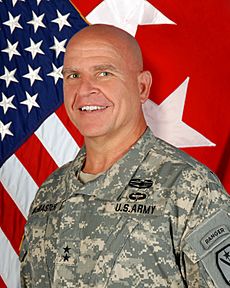H. R. McMaster facts for kids
Quick facts for kids
H. R. McMaster
|
|
|---|---|
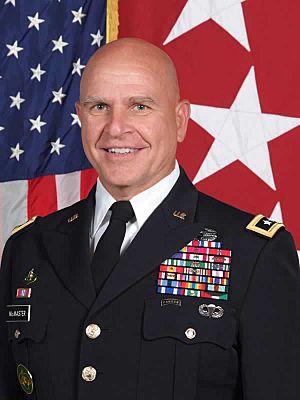
Official portrait, 2014
|
|
| 25th United States National Security Advisor | |
| In office February 20, 2017 – April 9, 2018 |
|
| President | Donald Trump |
| Deputy | K. T. McFarland Dina Powell Ricky Waddell |
| Preceded by | Michael Flynn |
| Succeeded by | John Bolton |
| Personal details | |
| Born |
Herbert Raymond McMaster
July 24, 1962 Philadelphia, Pennsylvania, U.S. |
| Spouse |
Kathleen Trotter
(m. 1985) |
| Children | 3 |
| Education | United States Military Academy (BS) University of North Carolina, Chapel Hill (MA, PhD) |
| Nickname | "The Iconoclast General" |
| Military service | |
| Allegiance | United States |
| Branch/service | United States Army |
| Years of service | 1984–2018 |
| Rank | Lieutenant General |
| Commands | Eagle Troop, 2nd Armored Cavalry Regiment 1st Squadron, 4th Cavalry Regiment 3rd Armored Cavalry Regiment Concept Development and Experimentation Directorate, Army Capabilities Integration Center Joint Anti-Corruption Task Force (Shafafiyat), International Security Assistance Force Maneuver Center of Excellence |
| Battles/wars |
|
| Awards | Army Distinguished Service Medal (3) Silver Star Defense Superior Service Medal Legion of Merit (2) Bronze Star (2) Purple Heart Defense Meritorious Service Medal (2) Army Meritorious Service Medal (5) Joint Service Commendation Medal Army Commendation Medal (4) Army Achievement Medal (4) |
Herbert Raymond McMaster, born on July 24, 1962, is a retired high-ranking general from the United States Army. He also served as the 25th National Security Advisor for the U.S. President from 2017 to 2018. He is well-known for his important roles in major conflicts like the Gulf War and the Iraq War.
McMaster was born in Philadelphia. He graduated from the United States Military Academy in 1984. He later earned a Ph.D. in American history from the University of North Carolina at Chapel Hill. His book, Dereliction of Duty, became a bestseller and is widely read in the U.S. military. During the Gulf War, he led a group of tanks in the Battle of 73 Easting.
After his military career, McMaster became a senior fellow at the Hoover Institution at Stanford University. He also hosts a podcast called Battlegrounds With H.R. McMaster.
Contents
Early Life and Education
H.R. McMaster was born in Philadelphia on July 24, 1962. His father, Herbert McMaster Sr., was a veteran of the Korean War and retired as a high-ranking Army officer. His mother, Marie C. McMaster, was a school teacher.
McMaster attended Valley Forge Military Academy for high school. He then went to the United States Military Academy at West Point, graduating in 1984. After West Point, he earned a Master of Arts and a Ph.D. in American history from the University of North Carolina at Chapel Hill.
His Ph.D. paper was about the Vietnam War. This paper later became his bestselling book, Dereliction of Duty (1997). The book explains how the Vietnam War became a major American conflict. It also discusses how military leaders at the time did not challenge the strategies of the Secretary of Defense and the President enough. This book is often read by people in the Pentagon and is on military reading lists.
Military Career Highlights
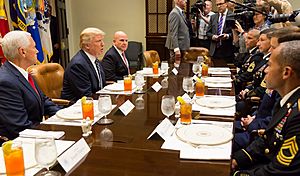
McMaster's first assignment was with the 2nd Armored Division at Fort Hood. In 1989, he joined the 2nd Armored Cavalry Regiment in Germany. With this unit, he was deployed to Operation Desert Storm during the Gulf War.
Battle of 73 Easting
During the Gulf War in 1991, McMaster was a captain. He commanded Eagle Troop of the 2nd Armored Cavalry Regiment. His troop fought in the Battle of 73 Easting. Even though they were greatly outnumbered, his nine tanks destroyed 28 Iraqi tanks in just 23 minutes without losing any of their own.
For his bravery, McMaster received the Silver Star medal. This famous battle is mentioned in several books about the Gulf War. It is also used in U.S. Army training exercises.
Teaching and Leadership Roles
After the Gulf War, McMaster taught military history at West Point from 1994 to 1996. He later commanded the 1st Squadron, 4th Cavalry Regiment, from 1999 to 2002. He then held several staff positions at U.S. Central Command (USCENTCOM).
In 2004, McMaster was given command of the 3rd Armored Cavalry Regiment. This regiment was sent to Iraq for its second tour. Their mission was to secure the city of Tal Afar. This mission was successful in defeating the insurgents in the city. President George W. Bush praised this success.
McMaster's tactics in Tal Afar were very effective. He had his soldiers stay in the city permanently. This helped the local people trust them and share information about the insurgents. These new tactics helped to overcome the Iraqi insurgency.
From 2007 to 2008, McMaster advised General David Petraeus on how to fight insurgencies. He helped revise the Army's Counterinsurgency Field Manual.
McMaster was promoted to brigadier general in 2009. He then became the Director of Concept Development and Learning for the U.S. Army Training and Doctrine Command (TRADOC). In 2010, he was chosen to be the Deputy to the Commander for Planning at the International Security Assistance Forces (ISAF) Headquarters in Afghanistan.
In 2012, McMaster was nominated for major general. He became the commander of the Army's Maneuver Center of Excellence at Fort Benning. In 2014, he was nominated for lieutenant general. He then became the Deputy Commanding General of the U.S. Army Training and Doctrine Command.
In 2011, Army Chief of Staff General Martin Dempsey called McMaster "probably our best Brigadier General." Time magazine also included him in its list of the 100 most influential people in the world in April 2014.
National Security Advisor Role
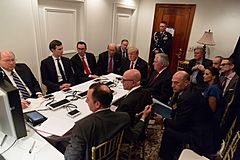
On February 20, 2017, U.S. President Donald Trump chose McMaster to be his National Security Advisor. This role involves advising the President on important security matters for the country. McMaster remained an active-duty general while serving in this position.
The United States Senate had to approve his appointment. On March 15, 2017, the full Senate confirmed McMaster by a vote of 86 to 10.
In February 2018, McMaster stated that it was "incontrovertible" (meaning, clearly true) that Russia interfered in the 2016 presidential election. He made this statement at an international conference, even with Russian officials present.
Resignation and Retirement
On March 22, 2018, McMaster resigned as National Security Advisor. He announced his plan to retire from the military soon after. President Trump announced John Bolton as McMaster's replacement. McMaster's retirement ceremony was held on May 18, 2018. He received his third Army Distinguished Service Medal at this ceremony.
Post-Military Career
After retiring from the Army, McMaster began working at Stanford University. He became a senior fellow at the Hoover Institution and a visiting fellow at the Freeman Spogli Institute for International Studies. He also teaches strategy at the Stanford Graduate School of Business.
McMaster is an advisory board member for several organizations. These include Spirit of America, Zoom Video Communications, and Shield Capital. He also advises Strider Technologies, a software firm.
In 2021, McMaster was appointed a Distinguished University Fellow at Arizona State University. He shares his knowledge on national security and defense issues there. He also guides students and hosts special events.
Books and Podcast
McMaster has written two bestselling books. His first book, Dereliction of Duty, was published in 1997.
His second bestselling book, Battlegrounds: The Fight to Defend the Free World, was published in September 2020. This book discusses important foreign policy topics like Russia, China, and the Middle East. Reviewers have praised it as a thoughtful and intelligent book for anyone interested in U.S. foreign policy.
In late August 2024, HarperCollins published McMaster's memoir about his time in the Trump White House. The book is titled At War with Ourselves – My Tour of Duty in the Trump White House.
McMaster also hosts a video and podcast series called Battlegrounds With H.R. McMaster. In this series, he talks with leaders from different countries about global challenges.
Awards and Badges
McMaster has received many awards and badges for his military service. Some of his notable awards include:
- Army Distinguished Service Medal (three awards)
- Silver Star
- Defense Superior Service Medal
- Legion of Merit (two awards)
- Bronze Star (two awards)
- Purple Heart
He also earned several badges, such as the Combat Action Badge and the Basic Parachutist Badge. He wears the Ranger tab, which shows he completed the challenging Ranger School.
 | Jewel Prestage |
 | Ella Baker |
 | Fannie Lou Hamer |


